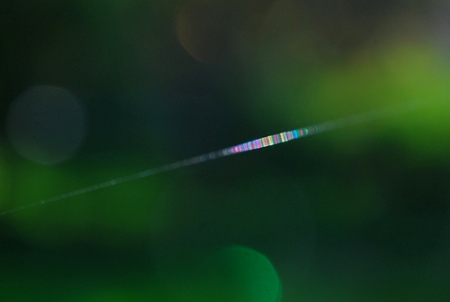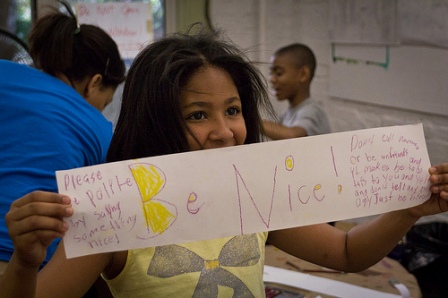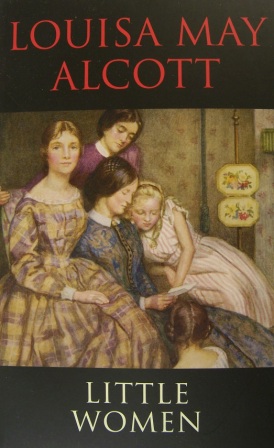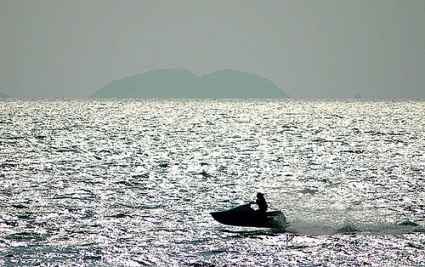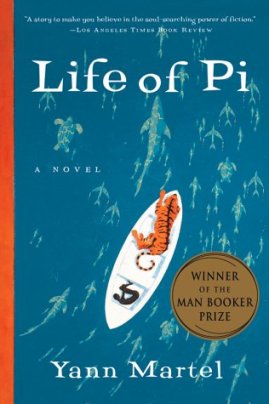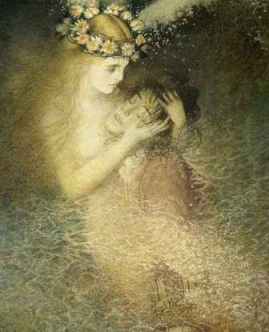21 October 2013
Eric Powell

I felt early on that I wanted to add to the “soup’”of this long and rich lineage. It is not a matter of feeling qualified to add my part; it is a matter of not accepting that I am not qualified. Much of the art and music that I most admire, upon some investigation, sprung from this sensibility; from a place of receptivity. This is where the underground reservoir can be accessed. It is sometimes difficult to maintain this state of mind. But if the internal fire is burning, we don’t have much of a choice. –Eric Powell
Visit Eric Powell’s website
18 October 2013
For Dave
“So you never know,” I would have told you. “If when you get up in the morning, it’s going be that day when you meet someone new and ride a jet ski for the first time.”
We were supposed to go walking on a Wednesday, but that Monday you were gone.
Last week, I went on that walk by myself.
It was a Thursday, not a Wednesday, and the fall colors had advanced by two weeks, but it was identical weather to that day – “partly sunny” and full of spiders. The spiders were everywhere. You couldn’t walk two feet without seeing one sitting in the middle of its web, watching you through eight beady little eyes. If you had been there, you would have offered your own take on the arachnid invasion, something outrageous and amusing that would make us both laugh.
Next we would walk past the shocking blue house, the sight of which always leaves me speechless. You would compare its color to something so obscure and perfect, I would never look at the house in the same way again.
When we came upon the secret stream, its existence unknown to the traffic above, we would listen to it murmur in the quiet spaces between the speeding cars. Here I would point out the few edible blackberries nestled among their withered siblings and we would treat ourselves to the last of the season. You would know better than to ask me the names of the purple flowers or tiny cherry-red berries. But if you did, I might have said, “Things don’t have to be named to be appreciated.” You would laugh and agree. Or maybe you would disagree, just to be adversarial.
At the new traffic light, we would stop and press the “walk” button. When the light changed, we would startle at the audio signal – a noise much like an automated weapon being fired. “Run for cover!” you’d yell, and when we were safely to the other side you’d say, “What the hell was that?” We would shake our heads and voice concern for the visually impaired, suffering constant duress from crosswalk gunmen.
When we reached the park, I would tell you about the fireworks show. In the 17 months since you’d been away, you would have missed two of them. Perhaps we would have walked on the dock, out into the lake. We might have sat on the bench where Nick and Adria scratched their names inside of a heart, and watched the cormorants balancing on their posts. I would have told you about the sunny day a few years ago, when I sat on this dock, watching all the motorboats and kayaks. A teenage girl rode up on her jet ski and struck up a conversation. She was staying with her dad for the weekend, she said, pointing to one of the big houses on the lake. “Would you like a ride?” she asked. And having never ridden a jet ski before, I said “yes”.
“So you never know,” I would have told you. “If when you get up in the morning, it’s going be that day when you meet someone new and ride a jet ski for the first time.”
Later, we would walk the last part on the bicycle path, along the playground and picnicking areas, past the competing houses on the water, and across the street to our usual meeting place. Back in the Commons by the bookstore, you would bemoan the loss of the Mexican Restaurant. “I know,” I would agree. “They had the best fish tacos. And the pizza place is Vietnamese food now.” You would find this puzzling, but shrug and go see what they had to offer.
If you had shown up that day, maybe over plates of sushi and noodles, I could have lured you out of the darkness that had become your home. But the thing about suicide is there’s no chance for rebuttal. The case is closed before every argument is heard.
So I find myself alone at our table, stuck in this never-ending loop of should haves and what ifs. But I know that I have to let it go. I have to let go of this guilt and this anger, and eventually, finally, this sorrow.
I will not dwell on that Monday. And when I do recall it, it will be to acknowledge and forgive our humanness.
Instead, I will count up the minutes and days, weeks and months, when you didn’t believe you could be here, but you stayed. You endured their treatment and drugs, their beds and their counseling. You tried, for a really really long time – much longer than you thought you could. And I love you and thank you for that.
You have been a generous friend, an engaged father, an outspoken crusader, a gifted writer, a bull-headed jackass, and an irreverent clown. But never, in all the years of our friendship, have you ever been a liar. So when the last thing you said to me was “Catch you later,” I find no alternative but to take you at your word.
Until then, my friend, know that you are missed.
And that you are loved. Always.
Anita Sheridan Price is a writer in Seattle, Washington
16 October 2013
Kelly Price
Just above the deadly nightshade
Three long spider threads float.
Each one, anchored on a nearby tree branch,
Has been abandoned by it’s industrious creator
For something Other.
Yet, they celebrate their uselessness
In the most regal way possible;
Waving their soft, silken arms in the breeze,
They send undulating shimmers of light
All the way out through the ends of their fingertips.
Hello and goodbye, hello and goodbye all at once,
Flowing with acceptance of the Cycles of Life.
Kelly Price is an artist in Sandpoint, Idaho
14 October 2013
Michael Grab

Over the past few years of practicing rock balance, simple curiosity has evolved into therapeutic ritual, ultimately nurturing meditative presence, mental well-being, and artistry of design. –Michael Grab
View more sculptures by Michael Grab and Gravity Glue
11 October 2013
Wang Ping
I discovered “The Little Mermaid” in 1969. That morning, when I opened the door to light the stove to make breakfast, I found my neighbor reading under a streetlight. The red plastic wrap indicated it was Mao’s collected work. She must have been there all night long, for her hair and shoulders were covered with frost, and her body shivered from cold. She was sobbing quietly. I got curious. What kind of person would weep from reading Mao’s words? I walked over and peeked over her shoulders. What I saw made me shiver. The book in her hands was Hans Christian Andersen’s fairy tales, and she was reading “The Little Mermaid.”
The day I heard the story in my kindergarten, I begged my mom to send me to school right away so that I could read the fairy tales by myself. By the end of my first grade, however, the Cultural Revolution began. Schools were closed, libraries sealed. Books, condemned as “poisonous weeds,” were burnt on streets. I thought I’d never see “The Little Mermaid” again.
Read the full story at River, Blood and Corn
Wang Ping is a Chinese-American writer, photographer and artist
